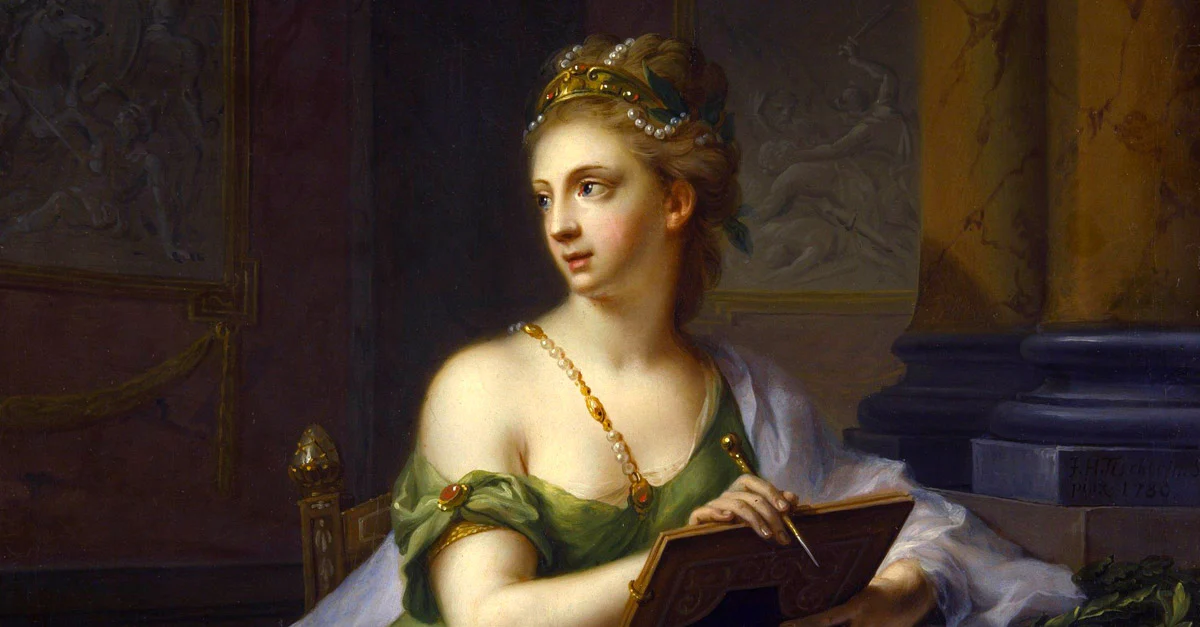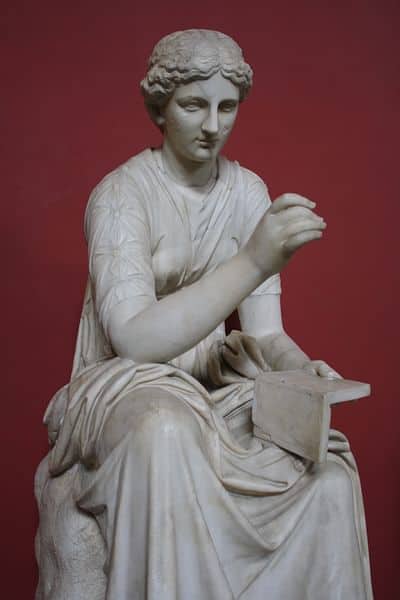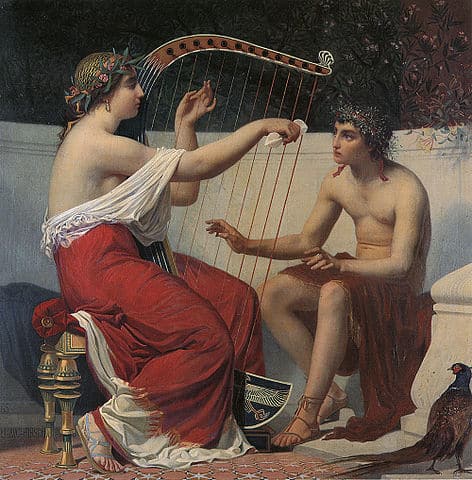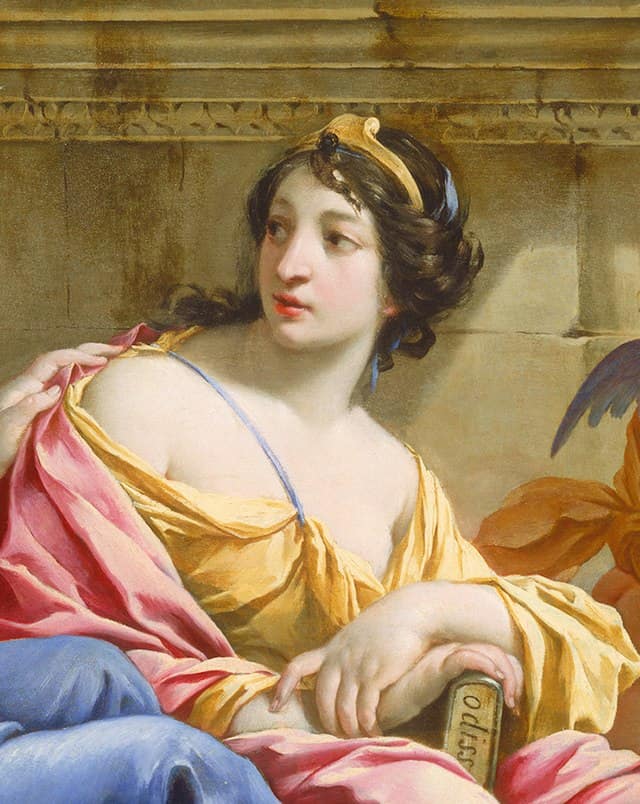Calliope, the Greek goddess of epic poetry, is steeped in history and myth. She is one of the nine Muses, daughters of Zeus and Mnemosyne, and is often depicted holding a writing tablet and stylus. Her name means “beautiful voice,” and she is said to inspire poets and writers to create their most significant works.
In Greek mythology, Calliope played a significant role in the lives of many heroes and gods. She was known to be the muse of Homer, the author of the Iliad and the Odyssey, and was also said to have inspired the great poet Virgil. According to legend, Calliope was present at the birth of Apollo and helped him learn to play the lyre. She was also present at the wedding of Peleus and Thetis, where she sang a hymn to the gods.
Despite her importance in Greek mythology, Calliope is not as well-known today as some of her fellow Muses. However, her legacy lives on through the works of the poets and writers she inspired. From the epic poems of ancient Greece to modern-day literature, Calliope’s influence can be seen in the written word.
Calliope’s Birth Story
Calliope is one of the nine Muses in Greek mythology. She is known as the Muse of Epic Poetry and is often depicted holding a writing tablet and stylus. Calliope’s birth story is interesting and sheds light on her divine origins.
According to Greek mythology, Calliope was the daughter of Zeus, the king of the gods, and Mnemosyne, the goddess of memory. Zeus was known for his many affairs with mortal women, but Mnemosyne was a Titaness and one of the few beings he truly loved. Together, they had nine daughters, the Muses, who were said to inspire artists, musicians, and writers.
Calliope was the eldest of the Muses and was born in Pieria, a region in ancient Greece. Her name means “beautiful-voiced” or “she of the beautiful voice,” Her singing was so enchanting that it could make even the gods weep. Calliope was also known for her intelligence and wisdom and was often sought out by mortals and immortals for advice.

The birth of the Muses was a significant event in Greek mythology, as it marked the beginning of a new era of art and culture. It was said that when Mnemosyne gave birth to the Muses, she did so on Mount Olympus, the home of the gods. Each Muse was born on a separate day, and each was said to have a unique talent or area of expertise.
In summary, Calliope’s birth story has divine origins and significance. As the daughter of Zeus and Mnemosyne, she was born to inspire and guide artists and writers. Her beautiful voice and wisdom have made her an enduring figure in Greek mythology and an inspiration to many throughout the ages.
Family
Calliope was the eldest of the nine Muses, daughters of the Titaness Mnemosyne and the god Zeus. Her siblings included Clio, Euterpe, Thalia, Melpomene, Terpsichore, Erato, Polyhymnia, and Urania.
As a goddess, Calliope did not have a husband or any affairs. Instead, she was known for her role as the muse of epic poetry and was often depicted holding a writing tablet and stylus.
Calliope’s mother, Mnemosyne, was the goddess of memory and was said to have had a romantic relationship with Zeus, resulting in the birth of the nine Muses. Calliope was said to have inherited her mother’s memory and was known for her ability to recall and recite epic poetry.
While Calliope had no sons, she was said to have been the mother of the famous bard Orpheus. According to legend, Orpheus was the son of either Calliope or the Thracian king Oeagrus.
Family ties were significant in Greek mythology, and the relationships between the gods and goddesses were often complex. While Calliope did not have a traditional family in the mortal sense, her role as the muse of epic poetry and her connection to her siblings and mother were significant parts of her identity as a goddess.
Husband and Affairs
Calliope was married to Oeagrus, the king of Thrace, and together, they had a son named Orpheus, who became a famous musician and poet. However, Calliope also had affairs with gods such as Apollo and Hermes.
According to some versions of the myth, Calliope was seduced by Apollo and became the mother of Orpheus. In other versions, Orpheus was born to Oeagrus, but Calliope was his true mother, as Apollo had impregnated her with the child.

Calliope was also known for her relationship with Hermes, the messenger of the gods. They had a son named Rhesus, a great warrior who fought in the Trojan War.
Despite her affairs, Calliope remained a respected goddess and was often called upon by mortals for her wisdom and inspiration. She was the muse of epic poetry and was believed to have inspired Homer’s Iliad and Odyssey, as well as many other works of literature.
Calliope’s relationships with her husband and other gods are complex and often intertwined with her role as a muse and inspiration to mortals.
Children
Calliope, the Greek Muse of epic poetry, was known to inspire poets to create epic works of literature. However, she was also associated with children. According to Greek mythology, Calliope was the mother of Orpheus, a legendary musician.
Calliope’s association with children is unsurprising, considering her role as the Muse of poetry. Poetry is often used to convey emotions, tell stories, and express ideas in a way that is accessible to people of all ages. As such, it is not uncommon for children to be exposed to poetry at a young age.
In addition to inspiring poets, Calliope was believed to have the power to protect children. Parents often called upon her to watch over their children and protect them from harm. This belief in Calliope’s protective powers was likely influenced by the fact that she was the mother of Orpheus, a child who was known for his musical talents and his ability to charm those around him.
Overall, Calliope’s association with children highlights the importance of literature and the arts in shaping the lives of young people. Through poetry and other artistic expression, children can learn to express themselves, understand the world around them, and appreciate the beauty of language and creativity.
Powers and Symbols
Calliope, the Greek Muse of epic poetry, has a range of powers and symbols associated with her. Her powers include inspiring poets, musicians, and writers to create epic works of art. Calliope is also known for her ability to sing and dance, making her a symbol of music and dance.
One of the most significant symbols associated with Calliope is the lyre, a stringed instrument commonly used in ancient Greek music. The lyre is often depicted in artwork featuring Calliope, and it is said that she was a skilled instrument player.

Calliope is also associated with trees, particularly the laurel tree, which was sacred to her. The laurel tree is often depicted in artwork featuring Calliope, and it is said that she would often rest under its branches while inspiring poets and musicians.
In addition to the lyre and the laurel tree, Calliope is also associated with song and poetry. She is often depicted holding a scroll or a book of poetry, and it is said that she would inspire writers and poets to create epic works of literature.
Overall, Calliope is a powerful and influential figure in Greek mythology, and her powers and symbols have significantly impacted art and literature throughout history.
Myths
Mythology
Calliope, the Greek goddess of epic poetry, is one of the nine Muses in Greek mythology. According to the legend, Calliope was the daughter of Zeus, the king of the gods, and Mnemosyne, the goddess of memory. She was the oldest and most respected of the Muses, and her name means “beautiful voice.” Calliope was often depicted holding a tablet and stylus, representing her role as the writing muse.
In mythology, Calliope was associated with the island of Lesbos, where she was said to have inspired the poet Homer to write the Iliad and the Odyssey. She was also believed to have inspired other great poets, including Ovid and Dante.
Inspiration
Calliope was known for her inspiring and uplifting presence, and poets, writers, and artists often called upon her to help them with their work. She was said to have a beautiful singing voice and was often depicted holding a lyre, a musical instrument she used to accompany her singing.
In addition to her role as the muse of epic poetry, Calliope was also associated with eloquence and beauty. She was said to have the power to inspire creativity and to help people express themselves more effectively.
One famous myth involving Calliope is the story of Orpheus, a legendary musician who was said to have been her son. According to the myth, Orpheus could charm even the gods with his music, and he used his talents to rescue his wife from the underworld. Although he ultimately failed in his quest, his story has been retold in many different forms throughout history.
Overall, Calliope was a powerful and inspiring figure in Greek mythology, and her influence can still be felt today in the works of poets, writers, and artists worldwide.
List of Interesting Facts and Death
Calliope is one of the nine Muses in Greek mythology. She was the muse of epic poetry, music, and eloquence. Here are some interesting facts about Calliope and her life and death:
- Death: Calliope was an immortal goddess and did not die. However, she was associated with death in Greek mythology as she was the mother of Orpheus, the famous musician who went to the underworld to retrieve his wife. Orpheus was eventually killed by the Maenads, the female followers of Dionysus, and his head was thrown into the river. Calliope is said to have mourned his death for a long time.
- Accuracy: Calliope was associated with accuracy in Greek mythology. She was believed to be the muse of eloquence and was often invoked by poets to help them find the right words. In some myths, she was also associated with memory and was believed to be the muse of history.
- Pimpleia: Calliope was born in Pimpleia, a city in ancient Macedonia. According to some myths, she was raised by the nymphs of Mount Helicon, where the Muses were believed to live.
- Magpies: Calliope was sometimes associated with magpies in Greek mythology. According to a myth, Calliope was once challenged by a group of magpies to a singing contest. Calliope won the contest, and the magpies were turned into black and white birds as a punishment.
- Corybantes: Calliope was sometimes associated with the Corybantes, a group of ecstatic dancers and musicians in Greek mythology. According to some myths, she was the mother of the Corybantes.
- Dante Alighieri: Calliope was mentioned by Dante Alighieri in his Divine Comedy. In the poem, Calliope is one of the Muses who inspired him to write his epic poem.
- Bob Dylan: Calliope was also mentioned by Bob Dylan in his song “Desolation Row.” In the song, Calliope is described as the “Mother of Muses.”
- Calliope Hummingbird: The Calliope hummingbird is named after Calliope, the smallest bird in North America. The bird is known for its high-pitched voice, which is reminiscent of the sound of a musical instrument.
- Science: Calliope is also the name of a genus of birds in the family Trochilidae. The genus includes the Calliope hummingbird and several other species of hummingbirds.
- Dictionary: Calliope is also listed in many dictionaries as a noun meaning “the muse of epic poetry.” The word is often used to describe someone inspiring or influential in the arts.
Frequently Asked Questions
What kind of power does Calliope have?
Calliope is the muse of epic poetry, which means she has the power to inspire poets and writers to create works of great scale and grandeur. She is also associated with eloquence and the spoken word.
Who are Calliope’s siblings?
Calliope is one of the nine muses, daughters of Zeus and Mnemosyne. Her siblings include Clio (muse of history), Euterpe (muse of music), Thalia (muse of comedy), Melpomene (muse of tragedy), Terpsichore (muse of dance), Erato (muse of love poetry), Polyhymnia (muse of sacred poetry), and Urania (muse of astronomy).
What is the origin of the name Calliope?
Calliope comes from the Greek words “kallos,” meaning beauty, and “ops,” meaning voice or face. This reflects her association with eloquence and the spoken word.
What are some famous myths about Calliope?
One famous myth about Calliope tells the story of her love affair with the mortal musician Orpheus. Another myth tells how she helped to inspire Homer to write the epic poems the Iliad and the Odyssey.
What is the significance of Calliope’s symbol?
Calliope is often depicted holding a writing tablet and stylus, symbolizing her role as the muse of epic poetry and inspiration. She is also sometimes depicted wearing a laurel wreath, symbolizing victory and achievement in ancient Greece.
How did Calliope come to be worshipped in ancient Greece?
The worship of the muses, including Calliope, dates back to ancient Greece. They were seen as divine beings who could inspire creativity and artistic expression. Temples and sanctuaries were built in their honor, and offerings were made to them in music, poetry, and dance.

